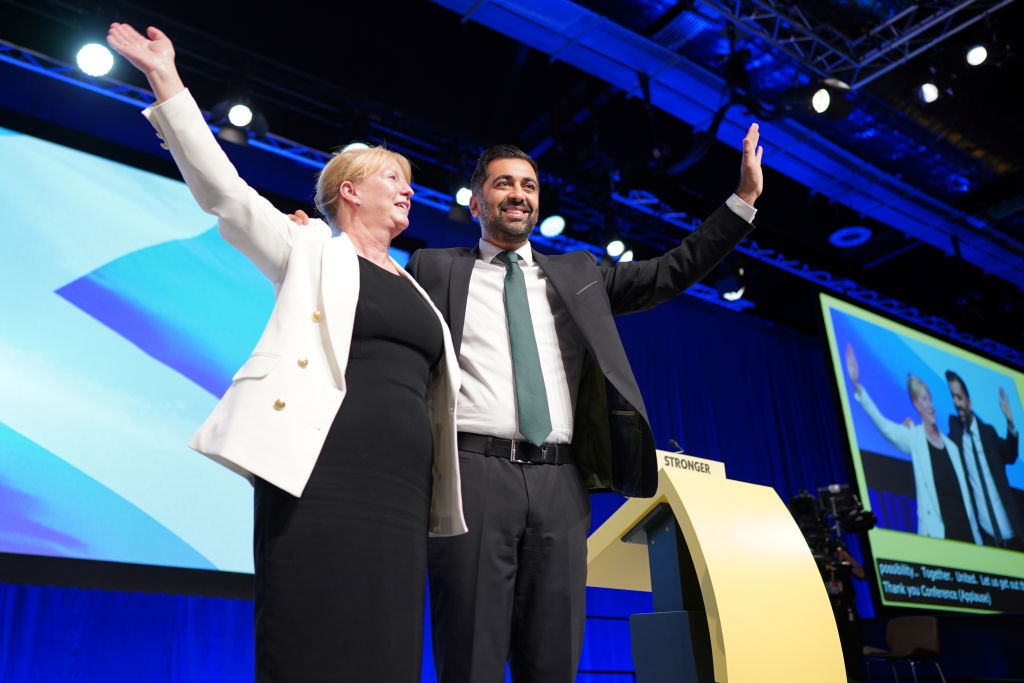Humza Yousaf’s main objective at this week’s SNP conference, his first as leader, was to free himself from the constitutional millstone placed round his neck by his predecessor Nicola Sturgeon: the ‘de facto’ referendum. He has united the party in ditching that phrase, though the phoney plebiscite remains in spirit.
The new policy states that if the SNP win a majority of seats at the next election the Scottish government will ‘begin immediate negotiations with the UK government to give democratic effect to Scotland becoming an independent country’. The Labour party and the Conservatives will negotiate by empty chair and, if the SNP lose seats next year as expected, will say that the nationalists lost their proxy referendum — however they calculate it.
Yousaf has had one clear achievement at this conference, at least. All sections of his fractious party have agreed with him that the SNP must stop arguing about ‘process’ and start campaigning positively for independence. The party must ‘concentrate not on the how — but on the why of independence’, as he put it in his speech. Above all, he said, the SNP must make the economic case for leaving the UK and show how Scots will enjoy ‘better living standards’ after independence. This will be a heroic task.
The SNP has always relied on retail politics to win elections
Scotland’s national deficit — the difference between what is spent and what is raised in taxation — is currently around £19 billion, or nine per cent of GDP. An independent Scotland would begin life with severe public spending restraint and/or tax increases, as the SNP’s own Sustainable Growth Commission’s proposals admitted in 2018.
Indeed, one of the reasons Sturgeon resorted to the constitutional theatre of Section 30 orders, Supreme Court applications and de facto referendum proposals was precisely to avoid having to remake the case for independence following the shock of Brexit. Then everything changed. Unlike in 2014, independence now means erecting a hard border with Scotland’s biggest trading partner, setting up an independent currency and negotiating a way back into the European Union, as well as doing without financial transfers from the UK under the Barnett Formula.
This is a hard road. Humza Yousaf isn’t interested in fiscal discipline, however. His speech was replete with crowd-pleasing spending announcements. In the space of 45 minutes he added nearly one billion pounds-worth of unfunded commitments to the Scottish budget: up to £500 million for offshore wind supply chain investment, £300m to reduce hospital waiting lists, £100 million for the arts — plus money for reviving city centres and helping victims of domestic violence. Where will he find the cash when we already know the devolved Scottish budget is facing a £1 billion spending shortfall this year?
Well, one answer might be extra borrowing. The SNP has finally recognised that the Scottish parliament has, since 2016, had powers to issue bonds on the international money markets. Humza Yousaf has promised Scotland’s first ever infrastructure bond will be issued next year. This will ‘bring Scotland to the attention of investors across the world’, said the FM, ‘as a place where investment returns can be made’.
Will the Scottish Greens be happy about hitching Scotland’s finances to the spivs and speculators of international finance capital? Perhaps this is a sign that Humza Yousaf has taken on board the views of his pro-growth leadership rival Kate Forbes (who has sidestepped this conference) and is happy to be criticised by his coalition partners.
Humza Yousaf is supposed to be committed to ‘progressive taxation’ and has been hinting for months about creating a new tax band of 44 per cent for people earning between £75,000 and £125,140. Today, however, he said nothing about this. In fact, the headline announcement in his first conference speech was a regressive restoration of the freeze on council tax — and something that has already received backlash from COSLA, the representative voice for councils. Yousaf has confirmed that it is indeed back to the future on local authority finance. He didn’t just leave councils dismayed, but the Greens too. Ross Greer, the Scottish Greens’ finance spokesperson, has insisted that a council tax freeze favours the rich more than the poor.
But the SNP has always relied on retail politics to win elections: free tuition fees, free personal care, free prescriptions. In fact, the SNP is still living in a world where borrowing can be unlimited and Scotland can emulate the living standards of countries like Norway without raising taxes to Scandinavian levels. It sounds rosy compared to the alternatives: under Keir Starmer, Labour has made a fetish of fiscal discipline and tax restraint. The shadow chancellor Rachel Reeves is sounding almost Thatcherite on spending, positioning herself as an ‘iron‘ chancellor who would rebuild Britain. The SNP hope that by keeping the spending taps open for another year they can persuade Scots to stick with them — at least until the next general election.







Comments